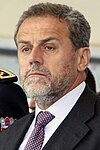2000 Zagreb local elections
| |||||||||||||||||||||||||||||||||||||||||||||||||||||||||||||
All 50 seats to the Zagreb Assembly 26 seats needed for a majority | |||||||||||||||||||||||||||||||||||||||||||||||||||||||||||||
|---|---|---|---|---|---|---|---|---|---|---|---|---|---|---|---|---|---|---|---|---|---|---|---|---|---|---|---|---|---|---|---|---|---|---|---|---|---|---|---|---|---|---|---|---|---|---|---|---|---|---|---|---|---|---|---|---|---|---|---|---|---|
| Turnout | 33.7% | ||||||||||||||||||||||||||||||||||||||||||||||||||||||||||||
| |||||||||||||||||||||||||||||||||||||||||||||||||||||||||||||
| |||||||||||||||||||||||||||||||||||||||||||||||||||||||||||||
Elections were held in Zagreb on 7 May 2000 for members of the Zagreb Assembly. The elections were called after the Croatian Democratic Union (HDZ) lost the majority in the Assembly, and the Croatian Government dismissed it and appointed an acting mayor.
In a record low turnout, the Zagreb Alternative coalition, led by the Social Democratic Party (SDP) and the Croatian Social Liberal Party (HSLS), won a majority of seats in the Assembly. The HNS was the biggest surprise in the election and won nine seats, while the HDZ suffered a heavy defeat and gained only five seats. Milan Bandić, who led the list of the SDP, was elected mayor by the Zagreb Assembly on 31 May.
Background
In the
On 11 March, the HDZ's Zagreb branch appointed Davorin Tepeš as its president, replacing the dismissed Zlatko Canjuga.[2] Kregar formally became the acting mayor on 13 March,[3] and snap elections were called for 7 May.[4]
The SDP and the HSLS participated in the elections in a coalition with the Croatian Peasant Party (HSS), the Social Democratic Action of Croatia (ASH), the Liberal Party (LS), and the Croatian Party of Pensioners (HSU). The coalition's name was Zagreb Alternative.[5]
Results
38 members of the Zagreb Assembly were elected proportionally using the D'Hondt method, and 12 were elected in 12 electoral districts by a majority system.[6] The Zagreb Alternative coalition won all 12 seats in the electoral districts. Along with the proportional system, the SDP won a total of 15 seats, the HSLS won 10 seats, the HNS 9 seats, the ASH–LS coalition six seats, the HDZ five, the Democratic Centre (DC) three, and the HSS two.[7][6]
The turnout of around 33% was unexpectedly low, compared to more than 67% in the previous elections. While the SDP and HSLS-led Zagreb Alternative secured a majority in the Assembly, they won an average of 15% fewer votes in Zagreb compared to the parliamentary election in January. The strong performance of the HNS, by winning slightly fewer votes than the SDP and much more than the HSLS, was the biggest surprise in the elections.[8] The HDZ gained only five seats, but won more votes than the polls before the elections predicted.[7]
On 31 May, the Assembly elected Bandić as the new mayor, and Darinko Kosor (HSLS) and Mladen Vilfan (LS) as his deputies. Franjo Zenko (HSLS) became the president of the Assembly.[9]
Assembly election
 |
|---|
| Parties and coalitions | Popular vote | Seats | ||||||
|---|---|---|---|---|---|---|---|---|
| Votes | % | ±pp | D'Hondt | Majority | Total | +/− | ||
| Social Democratic Party of Croatia (SDP) Croatian Party of Pensioners (HSU) |
48,146 | 20.98% | –2.93 | 9 | 6 | 15 | +1 | |
| Croatian People's Party (HNS) | 43,592 | 19% | +15.27 | 9 | 0 | 9 | +9 | |
| Croatian Social Liberal Party (HSLS) | 33,989 | 14.81% | +4.24 | 7 | 3 | 10 | +1 | |
| Social Democratic Action of Croatia (ASH) Liberal Party (LS) |
28,804 | 12.55% | +7.79 | 5 | 1 | 6 | +6 | |
| Croatian Democratic Union (HDZ) | 26,619 | 11.6% | –23.32 | 5 | 0 | 5 | –19 | |
| Democratic Centre (DC) | 15,532 | 6.77% | New | 3 | 0 | 3 | New | |
| Other lists | 0 | 2 | 2 | –1 | ||||
| Total: | 232,099 | 38 | 12 | 50 | ||||
| Invalid votes: | N/A | N/A | ||||||
| Turnout: | 232,099 | 33.7% | –33.91 | |||||
| Registered voters: | 688,996 | |||||||
| Source: City Election Committee[6][10] | ||||||||
See also
References
- ^ Cvijetić, Saša (11 March 2000). "The Art of Playing Football". Central Europe Review. 2 (10). Archived from the original on 9 July 2017.
- Croatian Radio Television. 11 March 2000. Archived from the originalon 13 February 2005. Retrieved 12 October 2019.
- Croatian Radio Television. 13 March 2000. Archived from the originalon 23 March 2005. Retrieved 12 October 2019.
- Croatian Radio Television. 20 March 2000. Archived from the originalon 3 September 2005. Retrieved 12 October 2019.
- Croatian Radio Television. 9 May 2000. Archived from the originalon 18 July 2001.
- ^ a b c "Izbori održani 7. svibnja 2000". Archived from the original on 27 February 2018. Retrieved 12 October 2019.
- ^ Croatian Radio Television. 8 May 2000. Archived from the originalon 24 March 2005. Retrieved 12 October 2019.
- ^ "Novi raspored političkih snaga u Hrvatskoj". Nacional. 11 May 2000. Archived from the original on 19 June 2000.
- Croatian Radio Television. 31 May 2000. Archived from the originalon 24 March 2005. Retrieved 12 October 2019.
- ^ "Zbirna lista za izbore za kandidatsku listu članova Gradske skupštine grada Zagreba" (PDF). Izborno povjerenstvo Grada Zagreba.




